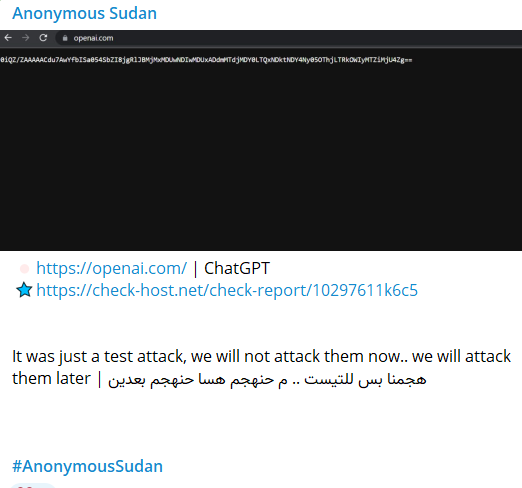The hacktivist group Anonymous Sudan has claimed to attack the website of the American artificial intelligence company OpenAI.
According to their post, the OpenAI cyber attack is not their primary offensive, hinting at further breaches of OpenAI in the future. This could also suggest a potential communication between the hacktivist group and the American AI giant.
Anonymous Sudan claims OpenAI cyber attack

“It was just a test attack, we will not attack them now.. we will attack them later,” Anonymous Sudan wrote on its Telegram channel referring to the alleged OpenAI cyber attack.
In a tweet, Threat Intelligence Service Falcon Feeds shared screenshots of the details shared by the hacktivist group post the alleged OpenAI cyber attack, adding that the website was active “at the moment”.

The Cyber Express has reached out to OpenAI for comments about the OpenAI cyber attack claim. We will update this report based on their response.
Earlier cyber attacks on OpenAI, ChatGPT
In March, OpenAI admitted that it suffered a security incident that revealed chat history, names, email addresses, and payment addresses among other sensitive data. In order the curb further damage, the company took some of its products offline.
The company addressed the OpenAI cyber attack impacting ChatGPT and said, “We took ChatGPT offline earlier this week due to a bug in an open-source library which allowed some users to see titles from another active user’s chat history.”
OpenAI ensures security amid escalating ChatGPT threats

With concerns around ChatGPT and its misuse increasing, its developer OpenAI recently declared that it will be working on a million-dollar project aimed at defensive cybersecurity using generative AI technology.
“Our goal is to work with defenders across the globe to change the power dynamics of cybersecurity through the application of AI and the coordination of like-minded individuals working for our collective safety,” OpenAI said in a company statement.
Anonymous Sudan threatens Microsoft, Claims data of 30 million users
Hacktivist group Anonymous Sudan often posts about its cyber attacks, targets, threats, warnings, and more, on its Telegram channel. The group overwhelms the targeted company’s website with DDoS attacks that render it inaccessible or crash it.

Recently, the hacker collective has claimed to have hacked into Microsoft and is allegedly holding data of 30 million users.
“Microsoft Outlook was down for thousands of American users Monday after pro-Russian hacktivist group Anonymous Sudan claims to have started a new campaign dedicated to targeting US companies and infrastructure,” a Cybernews report read.
Microsoft Outlook replied to users’s comments by saying that the company was trying to get the systems back on track and the issue was due to technical difficulties.
The cyber attacks on Microsoft were allegedly due to the US Secretary of State Antony Blinken meeting officials from Saudi Arabia.
The visit was to discuss the crisis in Sudan wherein Blinken announced several sanctions against the Sudanese Armed Forces and Rapid Support Forces for looting and attacking residences and infrastructure.
The group has been on an anti-America campaign declaring on its channel that the people should blame the government. “Blame your government for thinking about intervening in Sudanese internal affairs.”
The group threatened to target the US government, infrastructure, and large companies.
Media Disclaimer: This report is based on internal and external research obtained through various means. The information provided is for reference purposes only, and users bear full responsibility for their reliance on it. The Cyber Express assumes no liability for the accuracy or consequences of using this information.
